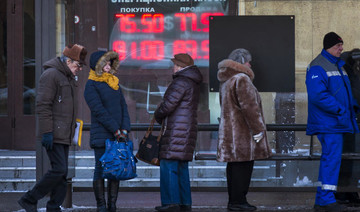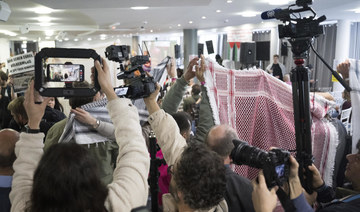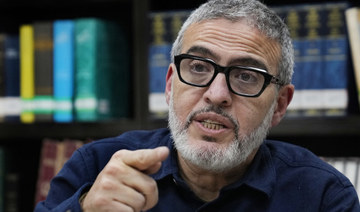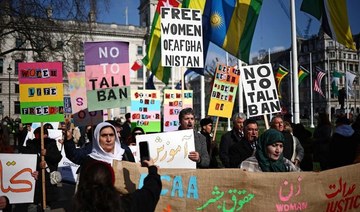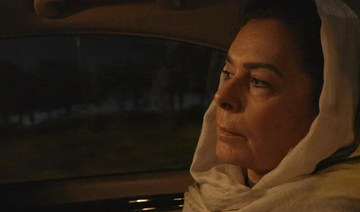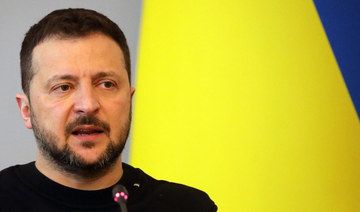MOSCOW: Mikhail Gorbachev, who as the last leader of the Soviet Union waged a losing battle to salvage a crumbling empire but produced extraordinary reforms that led to the end of the Cold War, died Tuesday. He was 91.
The Central Clinical Hospital said in a statement that Gorbachev died after a long illness. No other details were given.
Kremlin spokesman Dmitry Peskov said in a statement carried by Russian news agencies that Russian President Vladimir Putin offered deep condolences over Gorbachev’s death and would send an official telegram to Gorbachev’s family in the morning.
Though in power less than seven years, Gorbachev unleashed a breathtaking series of changes. But they quickly overtook him and resulted in the collapse of the authoritarian Soviet state, the freeing of Eastern European nations from Russian domination and the end of decades of East-West nuclear confrontation.
His decline was humiliating. His power hopelessly sapped by an attempted coup against him in August 1991, he spent his last months in office watching republic after republic declare independence until he resigned on Dec. 25, 1991. The Soviet Union wrote itself into oblivion a day later.
A quarter-century after the collapse, Gorbachev told The Associated Press that he had not considered using widespread force to try to keep the USSR together because he feared chaos in the nuclear country.
“The country was loaded to the brim with weapons. And it would have immediately pushed the country into a civil war,” he said.
Many of the changes, including the Soviet breakup, bore no resemblance to the transformation that Gorbachev had envisioned when he became Soviet leader in March 1985.
By the end of his rule he was powerless to halt the whirlwind he had sown. Yet Gorbachev may have had a greater impact on the second half of the 20th century than any other political figure.
“I see myself as a man who started the reforms that were necessary for the country and for Europe and the world,” Gorbachev told The AP in a 1992 interview shortly after he left office.
“I am often asked, would I have started it all again if I had to repeat it? Yes, indeed. And with more persistence and determination,” he said.
Gorbachev won the 1990 Nobel Peace Prize for his role in ending the Cold War and spent his later years collecting accolades and awards from all corners of the world. Yet he was widely despised at home.
Russians blamed him for the 1991 implosion of the Soviet Union — a once-fearsome superpower whose territory fractured into 15 separate nations. His former allies deserted him and made him a scapegoat for the country’s troubles.
His run for president in 1996 was a national joke, and he polled less than 1 percent of the vote.
In 1997, he resorted to making a TV ad for Pizza Hut to earn money for his charitable foundation. His former allies deserted him and made him a scapegoat for the country’s troubles.
“In the ad, he should take a pizza, divide it into 15 slices like he divided up our country, and then show how to put it back together again,” quipped Anatoly Lukyanov, a one-time Gorbachev supporter.
Gorbachev never set out to dismantle the Soviet system. What he wanted to do was improve it.
Soon after taking power, Gorbachev began a campaign to end his country’s economic and political stagnation, using “glasnost” or openness, to help achieve his goal of “perestroika” or restructuring.
In his memoirs, he said he had long been frustrated that in a country with immense natural resources, tens of millions were living in poverty.
“Our society was stifled in the grip of a bureaucratic command system,” Gorbachev wrote. “Doomed to serve ideology and bear the heavy burden of the arms race, it was strained to the utmost.”
Once he began, one move led to another: He freed political prisoners, allowed open debate and multi-candidate elections, gave his countrymen freedom to travel, halted religious oppression, reduced nuclear arsenals, established closer ties with the West and did not resist the fall of Communist regimes in Eastern European satellite states.
But the forces he unleashed quickly escaped his control.
Long-suppressed ethnic tensions flared, sparking wars and unrest in trouble spots such as the southern Caucasus region. Strikes and labor unrest followed price increases and shortages of consumer goods.
In one of the low points of his tenure, Gorbachev sanctioned a crackdown on the restive Baltic republics in early 1991.
The violence turned many intellectuals and reformers against him. Competitive elections also produced a new crop of populist politicians who challenged Gorbachev’s policies and authority.
Chief among them was his former protegee and eventual nemesis, Boris Yeltsin, who became Russia’s first president.
“The process of renovating this country and bringing about fundamental changes in the international community proved to be much more complex than originally anticipated,” Gorbachev told the nation as he stepped down.
“However, let us acknowledge what has been achieved so far. Society has acquired freedom; it has been freed politically and spiritually. And this is the most important achievement, which we have not fully come to grips with in part because we still have not learned how to use our freedom.”
There was little in Gorbachev’s childhood to hint at the pivotal role he would play on the world stage. On many levels, he had a typical Soviet upbringing in a typical Russian village. But it was a childhood blessed with unusual strokes of good fortune.
Mikhail Sergeyevich Gorbachev was born March 2, 1931, in the village of Privolnoye in southern Russia. Both of his grandfathers were peasants, collective farm chairmen and members of the Communist Party, as was his father.
Despite stellar party credentials, Gorbachev’s family did not emerge unscathed from the terror unleashed by Soviet dictator Josef Stalin: Both grandfathers were arrested and imprisoned for allegedly anti-Soviet activities.
But, rare in that period, both were eventually freed. In 1941, when Gorbachev was 10, his father went off to war, along with most of the other men from Privolnoye.
Meanwhile, the Nazis pushed across the western steppes in their blitzkrieg against the Soviet Union; they occupied Privolnoye for five months.
When the war was over, young Gorbachev was one of the few village boys whose father returned. By age 15, Gorbachev was helping his father drive a combine harvester after school and during the region’s blistering, dusty summers.
His performance earned him the order of the Red Banner of Labor, an unusual distinction for a 17-year-old. That prize and the party background of his parents helped him land admission in 1950 to the country’s top university, Moscow State.
There, he met his wife, Raisa Maximovna Titorenko, and joined the Communist Party. The award and his family’s credentials also helped him overcome the disgrace of his grandfathers’ arrests, which were overlooked in light of his exemplary Communist conduct.
In his memoirs, Gorbachev described himself as something of a maverick as he advanced through the party ranks, sometimes bursting out with criticism of the Soviet system and its leaders.
His early career coincided with the “thaw” begun by Nikita Khrushchev. As a young Communist propaganda official, he was tasked with explaining the 20th Party Congress that revealed Soviet dictator Josef Stalin’s repression of millions to local party activists. He said he was met first by “deathly silence,” then disbelief.
“They said: ‘We don’t believe it. It can’t be. You want to blame everything on Stalin now that he’s dead,’” he told The Associated Press in a 2006 interview.
He was a true if unorthodox believer in socialism. He was elected to the powerful party Central Committee in 1971, took over Soviet agricultural policy in 1978, and became a full Politburo member in 1980.
Along the way he was able to travel to the West, to Belgium, Germany, France, Italy and Canada. Those trips had a profound effect on his thinking, shaking his belief in the superiority of Soviet-style socialism.
“The question haunted me: Why was the standard of living in our country lower than in other developed countries?” he recalled in his memoirs. “It seemed that our aged leaders were not especially worried about our undeniably lower living standards, our unsatisfactory way of life, and our falling behind in the field of advanced technologies.”
But Gorbachev had to wait his turn. Soviet leader Leonid Brezhnev died in 1982, and was succeeded by two other geriatric leaders: Yuri Andropov, Gorbachev’s mentor, and Konstantin Chernenko.
It wasn’t until March 1985, when Chernenko died, that the party finally chose a younger man to lead the country: Gorbachev. He was 54 years old.
His tenure was filled with rocky periods, including a poorly conceived anti-alcohol campaign, the Soviet military withdrawal from Afghanistan, and the Chernobyl nuclear disaster.
But starting in November 1985, Gorbachev began a series of attention-grabbing summit meetings with world leaders, especially US Presidents Ronald Reagan and George Bush, which led to unprecedented, deep reductions in the American and Soviet nuclear arsenals.
After years of watching a parade of stodgy leaders in the Kremlin, Western leaders practically swooned over the charming, vigorous Gorbachev and his stylish, brainy wife. But perceptions were very different at home. It was the first time since the death of Soviet founder Vladimir Lenin that the wife of a Soviet leader had played such a public role, and many Russians found Raisa Gorbachev showy and arrogant.
Although the rest of the world benefited from the changes Gorbachev wrought, the rickety Soviet economy collapsed in the process, bringing with it tremendous economic hardship for the country’s 290 million people.
In the final days of the Soviet Union, the economic decline accelerated into a steep skid. Hyper-inflation robbed most older people of their life’s savings. Factories shut down. Bread lines formed.
And popular hatred for Gorbachev and his wife Raisa grew. But the couple won sympathy in summer 1999 when it was revealed that Raisa Gorbachev was dying of leukemia.
During her final days, Gorbachev spoke daily with television reporters, and the lofty-sounding, wooden politician of old was suddenly seen as an emotional family man surrendering to deep grief.
Gorbachev worked on the Gorbachev Foundation, which he created to address global priorities in the post-Cold War period, and with the Green Cross foundation, which was formed in 1993 to help cultivate “a more harmonious relationship between humans and the environment.”
Gorbachev took the helm of the small United Social Democratic Party in 2000 in hopes it could fill the vacuum left by the Communist Party, which he said had failed to reform into a modern leftist party after the breakup of the Soviet Union. He resigned from the chairmanship in 2004.
He continued to comment on Russian politics as a senior statesman — even if many of his countrymen were no longer interested in what he had to say.
“The crisis in our country will continue for some time, possibly leading to even greater upheaval,” Gorbachev wrote in a memoir in 1996. “But Russia has irrevocably chosen the path of freedom, and no one can make it turn back to totalitarianism.”
Gorbachev veered between criticism and mild praise for Russian President Vladimir Putin, who has been assailed for backtracking on the democratic achievements of the Gorbachev and Yeltsin eras.
He said Putin had done much to restore stability and prestige to Russia after the tumultuous decade following the Soviet collapse. He did, however, protest growing limitations on media freedom, and in 2006 bought one of Russia’s last investigative newspapers, Novaya Gazeta, with a businessman associate.
“We should — this is one of our goals — promote the newspaper’s qualitative development in the interests of democratic values,” he said, tacitly criticizing the Kremlin’s efforts to bring Novaya Gazeta and other independent media outlets to heel.
Gorbachev ventured into other new areas in his 70s, winning awards and kudos around the world. He won a Grammy in 2004 along with former US President Bill Clinton and Italian actress Sophia Loren for their recording of Prokofiev’s Peter and the Wolf, and the United Nations named him a Champion of the Earth in 2006 for his environmental advocacy.
Gorbachev had a daughter, Irina, and two granddaughters.
The official news agency Tass reported that Gorbachev will be buried at Moscow’s Novodevichy cemetery next to his wife.
Mikhail Gorbachev, who steered Soviet breakup, dead at 91
https://arab.news/8j9z3
Mikhail Gorbachev, who steered Soviet breakup, dead at 91
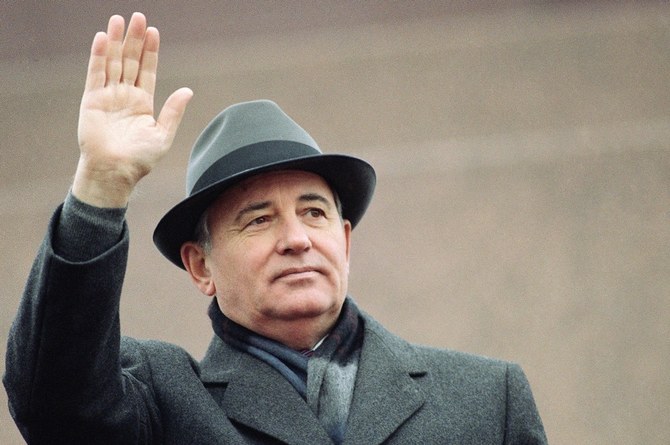
Sadiq Khan, Pakistani immigrant bus driver’s son, makes history by winning third term as London mayor
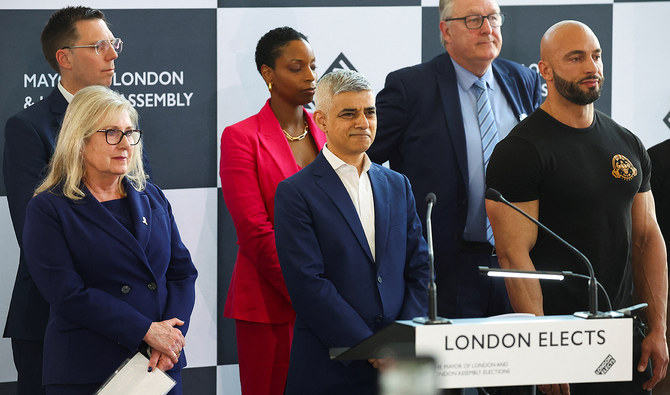
- Khan, an official with global renown, became the first Muslim mayor of a Western capital when elected in 2016
- Born in London in 1970, he grew up in public housing the Tooting area and slept in a bunk-bed until he was 24
LONDON: Sadiq Khan, who was Saturday re-elected for a record third term as London mayor, rose from humble roots to spar with world leaders and bring consequential change to the British capital.
The 53-year-old Labor party politician – a former human rights lawyer brought up on a London public housing complex – comfortably defeated Conservative rival Susan Hall for a third stint at City Hall.
He now overtakes predecessor Boris Johnson as the longest-serving holder of the post, which notably has powers over the emergency services, transport and planning in the city of nearly nine million.
Victory continues a remarkable journey for the Pakistani immigrant bus driver’s son, who became the first Muslim mayor of a Western capital when initially elected in 2016.
As mayor, he has made a name for himself as a vocal critic of Brexit and successive Conservative prime ministers, including Johnson, as well as for a feud with former US president Donald Trump.
The pair became embroiled in an extraordinary war of words after Khan criticized Trump’s travel ban on people from certain Muslim countries.
Trump then accused Khan of doing a “very bad job on terrorism” and called him a “stone cold loser” and a “national disgrace.”
The mayor in turn allowed an infamous blimp of Trump dressed as a baby in a nappy to fly above protests in Parliament Square during his 2018 visit to Britain.
“He once called me a stone cold loser. Only one of us is a loser, and it’s not me,” Khan told AFP during his 2021 campaign.
But Khan’s own tenure has not been without its controversies, particularly over last year’s expansion of an Ultra-Low Emission Zone into the largest pollution-charging scheme in the world.
The daily toll on the most-polluting vehicles prompted a fierce backlash in outer boroughs of Greater London, with anger at the extra financial burden during a cost-of-living crisis.
Khan has also been criticized for failing to get to grips with high levels of knife crime and since last year, his handling of large weekly pro-Palestinian protests.
Born in London in 1970 to parents who had recently arrived from Pakistan, Khan was the fifth child out of seven brothers and one sister.
He grew up in public housing in Tooting, an ethnically mixed residential area in south London, and slept in a bunk-bed until he was 24.
His modest background plays well in a city that is proud of its diversity and loves a self-made success story.
Khan still regularly recalls how his father drove one of London’s famous red buses, and his mother was a seamstress.
He is a handy boxer, having learnt the sport to defend himself in the streets against those who hurled racist abuse at him, and two of his brothers are boxing coaches.
He initially wanted to become a dentist, but a teacher spotted his gift for verbal sparring and directed him toward law.
He gained a law degree from the University of North London and started out as a trainee lawyer in 1994 at the Christian Fisher legal firm, where he was eventually made a partner.
He specialized in human rights, and spent three years chairing the civil liberties campaign group Liberty.
He represented Louis Farrakhan, leader of the Nation of Islam movement, and Babar Ahmad, a mosque acquaintance who was jailed in the United States after admitting providing support to the Taliban regime in Afghanistan.
Khan joined Labor aged 15 when Conservative prime minister Margaret Thatcher was in her pomp.
He became a local councilor for Tooting in the Conservative-dominated Wandsworth local borough in 1994, and its member of parliament in 2005.
He still lives in the area with his lawyer wife Saadiya and their two teenage daughters.
Labor prime minister Gordon Brown made him communities minister in 2008 and he later served as transport minister, becoming the first Muslim minister to attend Cabinet meetings.
In parliament, he voted for gay marriage – which earned him death threats.
As mayor, he vowed to focus on providing affordable homes for Londoners and freezing transport fares, but – like many in power around the world – saw his agenda engulfed by the pandemic.
He is London’s third mayor after Labor’s Ken Livingstone (2000-2008) and Johnson (2008-2016), with widespread speculation he could eventually try to follow in his predecessor and become prime minister.
London mayor Khan wins historic third term as Tories routed in local polls

- Khan, 53, easily beat Tory challenger Susan Hall to scupper largely forlorn Tory hopes that they could prise the UK capital away from Labour for the first time since 2016
- In the West Midlands, where Tory incumbent Andy Street is bidding for his own third term, votes were reportedly being recounted and too close to call
LONDON: London’s Labour mayor Sadiq Khan on Saturday secured a record third term, dealing the Conservatives another damaging defeat in their worst local election results in recent memory months before an expected general election.
Khan, 53, easily beat Tory challenger Susan Hall to scupper largely forlorn Tory hopes that they could prise the UK capital away from Labour for the first time since 2016.
The first Muslim mayor of a Western capital when first elected then, he had been widely expected to win as Labour surge nationally and the Conservatives suffer in the polls.
In the end, he saw his margin of victory increase compared to the last contest in 2021.
It adds to a dismal set of results for Prime Minister Rishi Sunak, as his Tories finished a humiliating third in local council tallies after losing nearly 500 seats in voting Thursday across England.
With Labour making huge gains, the beleaguered leader’s Conservatives lost crunch mayoral races in Manchester, Liverpool, Yorkshire as well as the capital and elsewhere.
In the West Midlands, where Tory incumbent Andy Street is bidding for his own third term, votes were reportedly being recounted and too close to call.
An unexpected Tory defeat there could leave Sunak with only one notable success: its mayor winning a third term in Tees Valley, northeast England — albeit with a vastly reduced majority.
Writing in Saturday’s Daily Telegraph, Sunak conceded “voters are frustrated” but insisted “Labour is not winning in places they admit they need for a majority.”
“We Conservatives have everything to fight for,” Sunak argued.
Labour, out of power since 2010 and trounced by Boris Johnson’s Conservatives at the last general election in 2019, also emphatically snatched a parliamentary seat from the Conservatives.
It seized on winning the Blackpool South constituency and other successes to demand a national vote.
“Let’s turn the page on decline and usher in national renewal with Labour,” party leader Keir Starmer told supporters Saturday in the East Midlands, where the party won the mayoral race.
Sunak must order a general election be held by January 28 next year at the latest, and has said he is planning on a poll in the second half of 2024.
Labour has enjoyed double-digit poll leads for all of Sunak’s 18 months in charge, as previous Tory scandals, a cost-of-living crisis and various other issues dent the ruling party’s standing.
On Thursday, they were defending nearly 1,000 council seats, many secured in 2021 when they led nationwide polls before the implosion of Johnson’s premiership and his successor Liz Truss’s disastrous 49-day tenure.
With almost all those results in by Saturday afternoon, they had lost close to half and finished third behind the smaller centrist opposition Liberal Democrats.
If replicated in a nationwide contest, the tallies suggested Labour would win 34 percent of the vote, with the Tories trailing by nine points, according to the BBC.
Sky News’ projection for a general election using the results predicted Labour will be the largest party but short of an overall majority.
Its by-election scalp in Blackpool — on a mammoth 26-percent swing — was the Conservatives’ 11th such loss in this parliament, the most by any government since the late 1960s.
Speculation has been rife in Westminster that restive Tory lawmakers could use the dire local election results to try to replace him. But that prospect seems to have failed to materialize.
However, it was not all good news for Labour.
The party lost control of one local authority, and suffered some councillor losses to independents elsewhere, due to what analysts said was its stance on the Israel-Hamas war.
Polling expert John Curtice assessed there were concerning signs for the opposition.
“These were more elections in which the impetus to defeat the Conservatives was greater than the level of enthusiasm for Labour,” he noted in the i newspaper.
“Electorally, it is still far from clear that Sir Keir Starmer is the heir to (Tony) Blair.”
A British-Palestinian doctor was denied entry to France for a Senate meeting about the war in Gaza
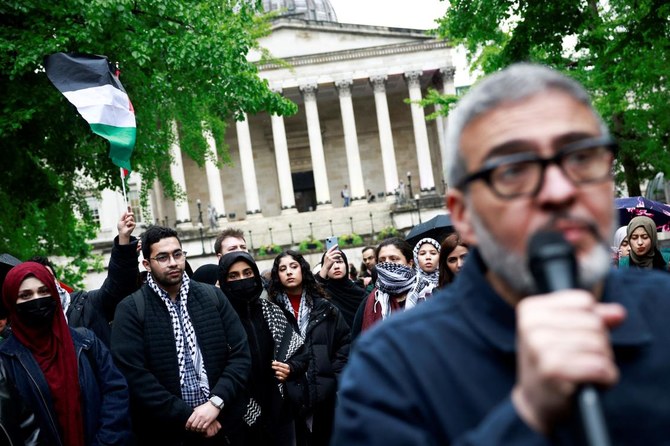
- Dr. Ghassan Abu Sitta was placed in a holding zone in the Charles de Gaulle airport and will be expelled, according to French Sen. Raymonde Poncet Monge
- Abu Sitta posted on social networks that he was denied entry in France because of a one-year ban by Germany on his entry to Europe
PARIS: A well-known British-Palestinian surgeon who volunteered in Gaza hospitals said he was denied entry to France on Saturday to speak at a French Senate meeting about the Israel-Hamas war. Authorities wouldn’t give a reason for the decision.
Dr. Ghassan Abu Sitta was placed in a holding zone in the Charles de Gaulle airport and will be expelled, according to French Sen. Raymonde Poncet Monge, who had invited him to speak at the Senate.
‘’It’s a disgrace,’’ she posted on X.
Abu Sitta posted on social networks that he was denied entry in France because of a one-year ban by Germany on his entry to Europe. Germany denied him entry last month, and France and Germany are part of Europe’s border-free Schengen zone. He posted Saturday that he was being sent back to London.
The French Foreign Ministry, Interior Ministry, local police and the Paris airport authority would not comment on what happened or give an explanation.
Abu Sitta had been invited by France’s left-wing Ecologists group in the Senate to speak at a colloquium Saturday about the situation in Gaza, according to the Senate press service. The gathering included testimony from medics, journalists and international legal experts with Gaza-related experience.
Last month Abu Sitta was denied entry to Germany to take part in a pro-Palestinian conference. He said he was stopped at passport control, held for several hours and then told he had to return to the UK He said airport police told him he was refused entry due to “the safety of the people at the conference and public order.”
Abu Sitta, who recently volunteered with Doctors Without Borders in Gaza, has worked during multiple conflicts in the Palestinian territories, beginning in the late 1980s during the first Palestinian uprising. He has also worked in other conflict zones, including in Iraq, Syria and Yemen.
France has seen tensions related to the Mideast conflict almost daily since the deadly Oct. 7 Hamas incursion into Israel. In recent days and weeks police have cleared out students at French campuses holding demonstrations and sit-ins similar to those in the United States.
Afghanistan’s only female diplomat resigns in India after gold smuggling allegations
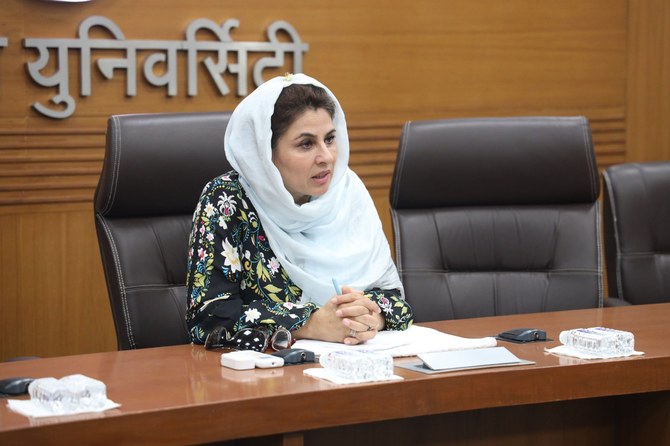
- Zakia Wardak, the Afghan consul-general for Mumbai, announced her resignation on her official account on the social media platform X
- According to Indian media reports, she has not been arrested because of her diplomatic immunity
ISLAMABAD: Afghanistan’s diplomat in India, who was appointed before the Taliban seized power in 2021 and said she was the only woman in the country’s diplomatic service, has resigned after reports emerged of her being detained for allegedly smuggling gold.
Zakia Wardak, the Afghan consul-general for Mumbai, announced her resignation on her official account on the social media platform X on Saturday after Indian media reported last week that she was briefly detained at the city’s airport on allegations of smuggling 25 bricks of gold, each weighing 1 kilogram (2.2 pounds), from Dubai.
According to Indian media reports, she has not been arrested because of her diplomatic immunity.
In a statement, Wardak made no mention of her reported detention or gold smuggling allegations but said, “I am deeply sorry that as the only woman present in Afghanistan’s diplomatic apparatus, instead of receiving constructive support to maintain this position, I faced waves of organized attacks aimed at destroying me.”
“Over the past year, I have encountered numerous personal attacks and defamation not only directed toward myself but also toward her close family and extended relatives,” she added.
Wardak said the attacks have “severely impacted my ability to effectively operate in my role and have demonstrated the challenges faced by women in Afghan society.”
The Taliban Foreign Ministry did not immediately return calls for comment on Wardak’s resignation. It wasn’t immediately possible to confirm whether she was the country’s only female diplomat.
She was appointed consul-general of Afghanistan in Mumbai during the former government and was the first Afghan female diplomat to collaborate with the Taliban.
The Taliban — who took over Afghanistan in 2021 during the final weeks of US and NATO withdrawal from the country — have barred women from most areas of public life and stopped girls from going to school beyond the sixth grade as part of harsh measures they imposed despite initial promises of a more moderate rule.
They are also restricting women’s access to work, travel and health care if they are unmarried or don’t have a male guardian, and arresting those who don’t comply with the Taliban’s interpretation of hijab, or Islamic headscarf.
Russia puts Ukraine's Zelensky on wanted list, TASS reports
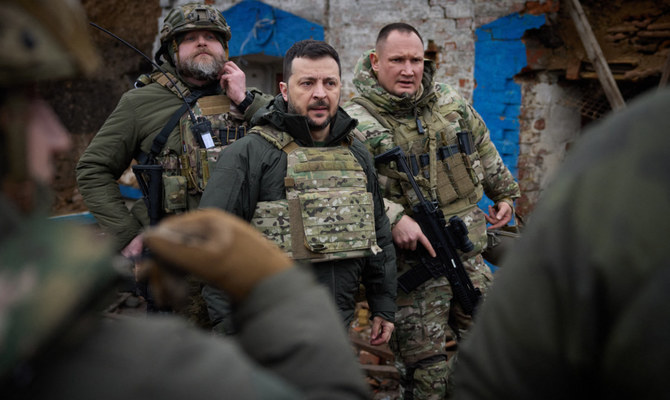
- Russia has issued arrest warrants for a number of Ukrainian and other European politicians
MOSCOW: Russia has opened a criminal case against Ukrainian President Volodymyr Zelensky and put him on a wanted list, the state news agency TASS reported on Saturday, citing the Interior Ministry's database.
The entry it cited gave no further details.
Russia has issued arrest warrants for a number of Ukrainian and other European politicians since the start of the conflict with Ukraine in February 2022.
Russian police in February put Estonian Prime Minister Kaja Kallas, Lithuania's culture minister and members of the previous Latvian parliament on a wanted list for destroying Soviet-era monuments.
Russia also issued an arrest warrant for the International Criminal Court (ICC) prosecutor who last year prepared a warrant for President Vladimir Putin on war crimes charges.




